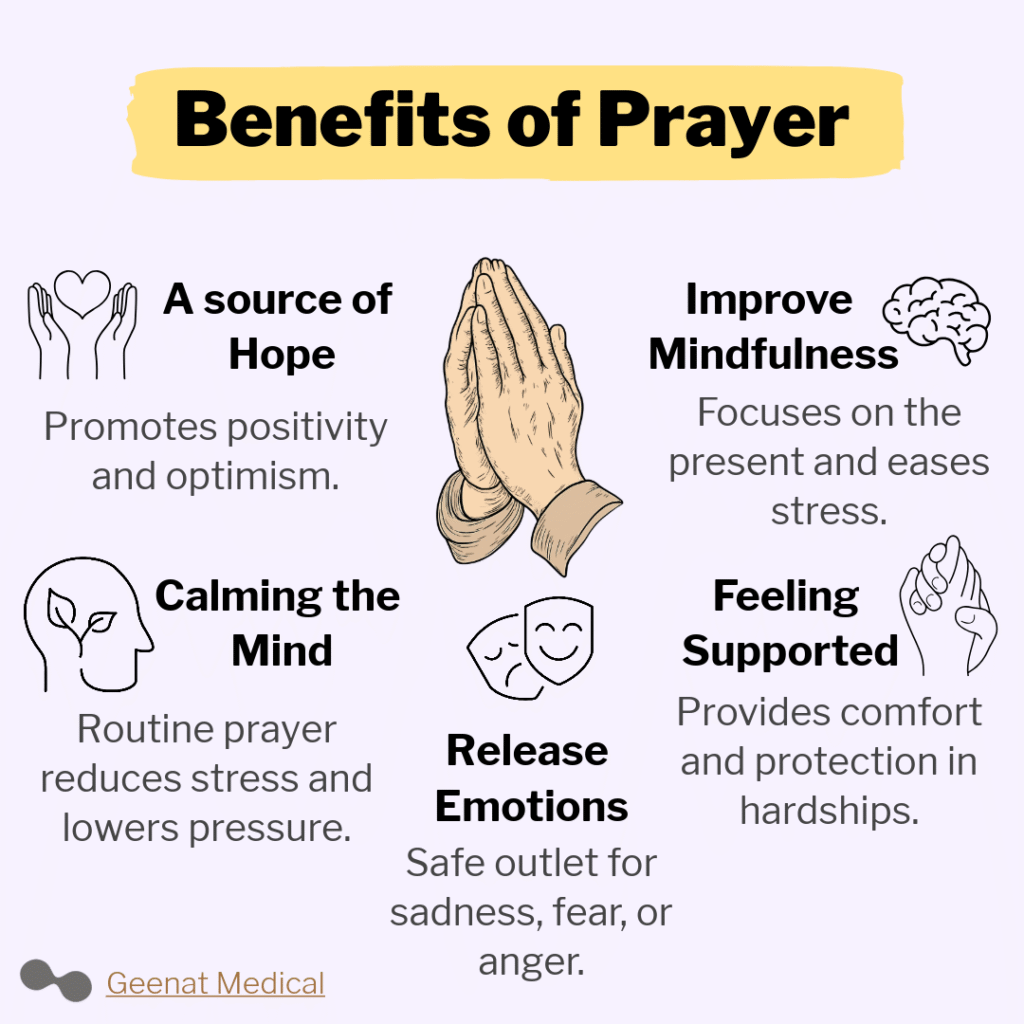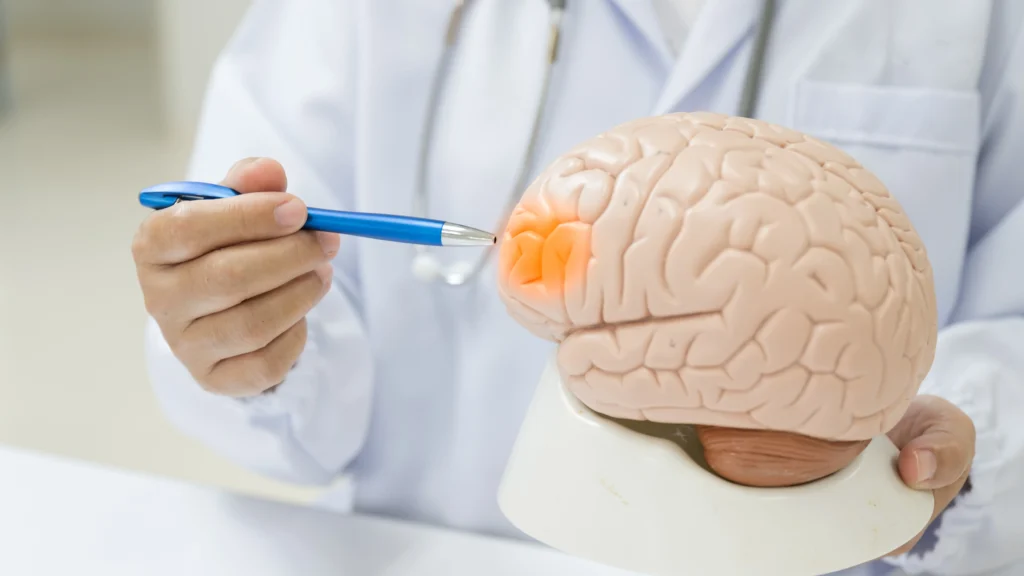In psychology, mood is defined as an emotional state that lasts longer than fleeting feelings, influencing an individual’s general psychological state, perception, and behavior. In our lives, we may experience waves of a foul mood from time to time, leaving us to search for healthy ways to pull ourselves out of our poor mental state and help improve and revitalize our inner selves.
We might turn to a healthy diet to boost our spirits, sometimes we might resort to exercise to turn our mood equation around, and at other times we might choose to sit in nature, connect with loved ones, or listen to music to elevate our psychological well-being. All of these are undoubtedly beneficial methods for our health. But what about spirituality and its role in improving mood, and what are the mental benefits of prayer for a person?
——- Ad ——-
——- Ad ——-
The Definition of Prayer in Medicine
From a medical perspective, prayer or spirituality is not merely a matter of reciting specific texts or performing certain movements. Rather, it is a behavioral and mental practice of a religious nature that involves a person’s connection with a higher power, aiming to evoke superior emotions such as love, compassion, awe, trust, gratitude, forgiveness, joy, and connection.
These feelings are not centered solely on the ego or the self; instead, they embody what biologist Charles Darwin called “social instincts.” They enable us to renounce selfishness and open up to others.
Therefore, some physicians and psychotherapists may recommend that their patients perform prayers as part of a prescribed treatment plan, in accordance with the patient’s faith. This is due to the potential effective impact of worship in consolidating these positive emotions within the human psyche and bringing it out of its isolation.
Your Brain During Prayer
In reality, prayer can stimulate the brain to meditate, remember, focus, calm down, and be deliberate—important traits that give your brain total control over itself. Consequently, it becomes a path for individuals to improve their mood and perceive their surroundings more broadly.
These positive changes in the brain occur through increased activity in specific brain regions. According to neuroscientist Dr. Andrew Newberg, prayer is associated with a noticeable increase in the activity of the frontal lobe (a part of the brain responsible for focus and emotion regulation), which generates a deep sense of presence and tranquility.
On the other hand, the rituals of prayer can activate neural pathways in the brain that use the hormones dopamine and serotonin, thereby helping to improve mood and feelings of satisfaction. This is attributed to prayer’s potential role in activating the reward system in the human brain after fulfilling a religious duty. This process activates those neural pathways, leading to the release of neurotransmitters related to happiness, pleasure, and human connection.
However, the degree of religious sincerity is a significant factor in measuring the psychological returns of prayer. A study compared the brain activity of religious and non-religious individuals during meditation on prayer using Magnetic Resonance Imaging (MRI) and noted a significant difference in frontal lobe activity between the two groups. This means that the authenticity of the religious experience and spiritual immersion in prayer are what determine the level of brain activity in the person praying.
——- Ad ——-
——- Ad ——-
How Prayer Improves Mood?
After reviewing the changes that occur in the brain during prayer, we can distill a number of its psychological benefits as follows:
1. Enhancing Mindfulness: Prayer, with its elements of reverence and concentration, closely resembles mindfulness exercises. As you commit to this deep focus, your mind centers on the present moment, preventing you from worrying about the future or regretting the past. Science has confirmed the effectiveness of this mechanism in significantly reducing stress and improving mood.
2. Feeling of Support and Security: Prayer provides an individual with a sense of ultimate support, and the presence of a higher power that accompanies and cares for them in the face of difficulties and challenges. It gives them a feeling of protection and immunity from dangers and crises.
3. Venting Negative Feelings: Prayer represents a safe outlet for a person to express their thoughts and release latent negative energy such as sadness, fear, frustration, and anger, with complete freedom and without judgment. This act is very similar to talking to a psychotherapist or using therapeutic writing.
4. A Source of Hope: Spirituality fosters positivity and optimism, telling its practitioners that difficulties can be overcome and a better state can be achieved. The brain responds to this with happiness and enthusiasm, which positively reflects on one’s mood.
5. Calming the Mind: The rhythmic and routine nature of prayer (such as repeating supplications or regular physical movements) has a calming and relaxing effect. This routine activates the parasympathetic nervous system (responsible for rest and relaxation), which reduces the “fight-or-flight” response caused by stress and lowers heart rate and blood pressure.

Other Ways to Improve Your Mood
Prayer offers an individual numerous benefits for their mental health, but it should be supplemented with other methods to fortify your mood and psychological state at all times.
As we hinted in the introduction, exercise, a healthy diet, spending time in nature, and listening to music are all methods that improve mood and support psychological well-being. To these we can add:
● Get a good night’s sleep: You are likely aware that your body needs 7-9 hours of sleep daily, and that getting this amount of sleep is sufficient to improve your mood and refresh your brain functions.
● Make time to laugh: Laughter has numerous benefits for the body and mind; it helps alleviate daily stress and improve mood. To stimulate laughter, watch comedy shows, mingle with cheerful people, or practice laughter yoga.
● Practice meditation: While prayer does include aspects of meditation, meditation itself is a complete and structured process with many types, such as guided meditation and transcendental meditation. Applying these systems meticulously leads to deeper concentration, mental clarity, and maximum stress reduction.
● Do good deeds: Studies have shown that acts of charity, giving, or kindness can give a person a sense of purpose and create a feeling of accomplishment and reward, which fosters a sense of joy and euphoria. The act of doing good can itself be a form of prayer and religious practice.
——- Ad ——-
——- Ad ——-
Conclusion
Prayers open a window for you to a wide spectrum of positive emotions that can charge your energy, sharpen your strengths, cultivate your faith in a brighter tomorrow, and motivate you to work and achieve. It is essential to remember that prayer is just one tool among several for improving mood, and it is not a magic bullet or the sole solution for mental health problems.
○ Share the article:
References
(1) Vaillant G. E. (2008). Positive emotions, spirituality and the practice of psychiatry. Mens sana monographs, 6(1), 48–62.
(2) Verghese, Abraham. Spirituality and mental health. Indian Journal of Psychiatry 50(4):p 233-237, Oct–Dec 2008. | DOI: 10.4103/0019-5545.44742
(3) Pargament, K. I., Exline, J. J., & Jones, J. W. (2013). APA handbook of psychology, religion, and spirituality (Vol 1): Context, theory, and research (pp. xxvii-740). American Psychological Association.
(4) D’Souza RF, Rodrigo A. Spiritually Augmented Cognitive Behavioural Therapy. Australasian Psychiatry. 2004;12(2):148-152. doi:10.1080/j.1039-8562.2004.02095.x


